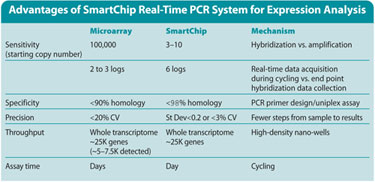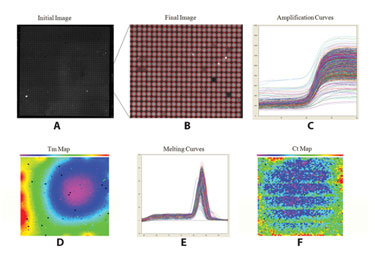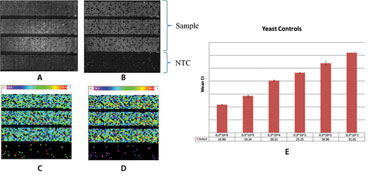August 1, 2009 (Vol. 29, No. 14)
Next-Generation Platform Combines Microarray Throughput with Sensitivity
Gene-expression profiling is an integral part of biomarker discovery as well as discovery and validation of new therapeutic targets to support drug development. Initially, profiling the intracellular range of transcript abundance relied on hybridization-based technology, such as microarrays or spotted cDNA arrays, or sequencing-based technology such as SAGE. Due to inherent technical limitations, neither method provides an accurate quantification of the broad range of transcript levels present in a given sample.
This is particularly true in the case of low-abundance transcripts due to the fact that signal-to-noise ratios decrease exponentially with the decrease of transcript number. In contrast, the signal-to-noise ratio is constant in real-time PCR facilitating the accurate measurement of low-abundance transcripts. Typically, large changes in gene expression can be underestimated or entirely missed by hybridization-based technologies.
Quantitative PCR (qPCR)-based gene-expression profiling is the current gold standard for the precise monitoring of a selected set of genes to validate results of a hybridization-based microarray experiment. However, the overall limitations of qPCR and hybridization-based technologies have created a need for a next-generation platform capable of combining the advantages of these two technologies, while addressing their shortcomings, in a single system.
WaferGen Biosystems has developed a platform for rapid quantitative gene-expression analysis. This technology, referred to as the SmartChip™ Real-Time PCR System, is equipped with a high-density, rapid-cycling configuration capable of providing high-throughput levels, while offering discovery and validation capabilities in a single step.
The platform performs thousands of nanoscale quantitative PCR assays in a single run, essentially combining the screening capability of microarrays with the sensitivity of qPCR. This enables life scientists to identify a broad spectrum of expressed genes in a single day, while still discriminating small changes in expression. The SmartChips can be configured to analyze large numbers of genes on a single sample, or interrogate many targeted sets of genetic markers on many samples at once.
Whole-genome assay time may be significantly reduced with the SmartChip system as compared to several days or months with microarrays or real-time PCR, respectively. Additionally, it is estimated that this platform will generate expression results 48 times faster and at 50% less cost than conventional methods.
The SmartChip system also incorporates a number of ease-of-use features including content-ready, high-density chips containing 5,000–30,000 nano-wells with gene panels optimized for cancer, toxicology, and whole genome. The platform requires a small sample size as compared to other technologies and offers real-time detection and sophisticated read-out options while assuring detection sensitivity and temperature uniformity across chips.
The SmartChip platform consists of content-ready SmartChips, a sample dispenser, a real-time PCR instrument, and analysis software. To date, 5,184-well and primer loaded SmartChips have been fabricated and used to measure ~1,000 genes in total RNA samples derived from matched normal and lung tumor tissue (Table).

Advantages of SmartChip real-time PCR system for expression analysis
Results
Researchers have been able to demonstrate complete reproducibility across 5,184 wells with the SmartChip system. In one test, a reaction mix containing all the components for a GAPDH real-time PCR assay was assembled and dispensed into 5,184 wells in a SmartChip using the system’s custom nanodispenser. Data collected following 40 cycles demonstrated the platform’s ability to simultaneously achieve consistent results across thousands of wells (Figure 1).
Additional tests have demonstrated the SmartChip platform’s sensitivity and dynamic range. In one experiment (Figure 2), researchers showed that the SmartChip system possesses a sensitivity of three copies and a dynamic range of five logs.
Additional testing has confirmed the system’s ability to perform and meet analytical performance specifications, while demonstrating the miniaturization of reaction volumes from 10 µL to 100 nL. Real-time results were generated in under three hours for ~1,000 genes in triplicate with 300–500 ng of starting total RNA. Furthermore, researchers successfully tested total RNA samples derived from matched normal and tumor tissues samples from the lung.

Figure 1. Human reference gene GAPDH assay was dispensed onto the entire chip covering 5,184 wells using the custom nanovolume dispenser, sealed with an adhesive film and cycled for 40 cycles followed by melting curve analysis.

Figure 2. Primer-loaded 1000-gene SmartChip was filled with cDNA sample and master mix or master mix without cDNA as negative control, sealed and cycled for 40 cycles followed by melting curve analysis.
Smartchip Research Programs
The SmartChip system is currently being used in gene-expression research at the University of Pittsburgh Medical Center and the University of Texas Southwestern Medical Center. These research programs are designed to identify and validate therapeutically relevant gene-expression biomarkers in chronic obstructive pulmonary disease, idiopathic pulmonary fibrosis, lung cancer, and wound healing.
Additionally, a SmartChip genotyping research collaboration has been established with scientists in the Institute for Genome Sciences and Policy at Duke University Medical Center. The focus of this program is the validation of SNPs that are related to breast cancer as well as an examination of the impact that validated SNPs have on patients’ disease prognosis and response to treatment.
David Gelfand, Ph.D. (david.gelfand@ wafergen.com), is CSO, and Kumar Kastury, Ph.D. ([email protected]), is vp of research and technical operations at WaferGen Biosystems. Web: www.wafergen.com.



